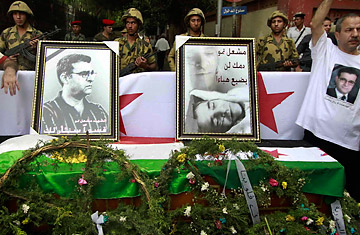
Syrian antigovernment activists display wreaths and framed photos of slain activist Mashaal Tammo during a protest, as Egyptian army soldiers secure the surrounding area of the Syrian embassy in Cairo on Tuesday, Oct. 11, 2011
(2 of 2)
Yet another obstacle, according to anti-Assad activists, is the Kurdistan Workers Party (PKK), the militant group whose nearly 30-year conflict with Turkey has claimed over 40,000 lives. (On Oct. 19, the PKK staged a series of coordinated attacks in southeast Turkey, killing 24 soldiers.) Many Turkish analysts believe that Assad is using the PKK or one of its factions as leverage against the Turks, who have lost all faith in the Syrian government. "Even if Syria doesn't admit this, there is a link between them and the PKK," says Huseyin Yayman, a Turkish expert. "With Syria's backing, the PKK has room to operate against Turkey." The PKK has done little to dispel such suspicions. In a recent interview, Cemil Bayik, one of the group's leaders, warned that if Turkey were to intervene against Assad, the PKK would fight on Syria's side.
As far as Ismail Hami is concerned, the PKK serves yet another purpose for Assad: to keep the Syrian Kurds in check. Hami, whose Kurdish Yekiti Party openly sides with the Syrian opposition, wants nothing to do with the PKK. "They have pulled their party [the PYD, the PKK's Syrian branch] out of the negotiations with the other Kurdish parties," he says. "They have another attitude to what is happening in Syria. We cannot work together. They do not support the protests." Ose goes a step further, accusing the PKK of having played a role in her friend's killing. "They had threatened Mashaal many times," she says. "They attacked my house in Damascus, and they told me, exactly, 'We will kill you and kill Mashaal ... not by night but by day.' " They warned her not to work with the mainstream Arab opposition, she says, telling her, "You are not good for what we want."
In May, during a protest in Qamishli, Ose recalls, the PYD did its best "to make this demonstration weaker, smaller and not important." Then, she says, it hoisted banners of imprisoned PKK leader Abdullah Ocalan as well as PKK flags. "We're against this flag," says Ose. "We're against any flag except the Syrian national flag. We are Syrian ... We don't want the Syrian regime to [be able to] say this is a message to Turkey. Our problem is with Bashar, not with anyone else."
In response to claims of involvement in Tammo's murder, Roj Welat, a PKK spokesman, noted via e-mail that the PKK condemned the assassination as well as "all attacks against all Kurdish politicians in all states." Most probably, he wrote, "the assassination [was] carried out by those who wanted to break up the unity of the Kurdish opposition." The PYD, he added, "already said that this assassination against a Kurdish politician [was] carried out by Turkey. Turkey already has a very profound history record of political assassinations on the Kurdish people and other ethnic backgrounds, both in Turkey and in the region."
Asked to provide his position on the anti-Assad uprising, Welat acknowledged "great problems in Syria" but refrained from criticizing the Assad regime. The solution to Syria's problem lies in democracy and freedom, he wrote, as well as in "democratic autonomy for Kurds living in Syria."
The Kurdish protesters are clearly concerned with being identified as a separatist movement. Although Hami acknowledges that his party's ultimate goal may be Kurdish autonomy, he is quick to clarify, "We see the Kurdish areas as a part of Syria. We have no ideas about separation." Talking about autonomy, especially at this point, says Ose, "is a crazy idea."
Yet it is precisely this issue that has led the mainstream Arab opposition to keep the Kurds at arm's length, says Joshua Landis, a Syria expert at the University of Oklahoma. The opposition, he says, is "leery of promising too much to the Kurds." Strategically, the Kurds would be an advantage, perhaps even a decisive one, Landis believes. Politically, however, they could be a liability. "The opposition understands that the Kurds are an important potential ally in weakening the government, but they're an ally that could easily become a Frankenstein," says Landis. "If they begin asking for autonomy and so forth, the government is going to be able to use that against the opposition."
Landis continues, "Once you stimulate the Kurds to make trouble for the government, the government will say, Look, these people are going to tear Syria apart." By raising the specter of another Iraq, he says, the government "will get the sympathy of people in Damascus and Aleppo who are frightened of the Jazirah [the predominantly Kurdish northeast]." For them, he says, "the Jazirah stands for poverty — and anger."
Reached by phone last Friday, Ore, her voice drowned out by antiregime slogans shouted into a loudspeaker, was attending another demonstration in Qamishli.
